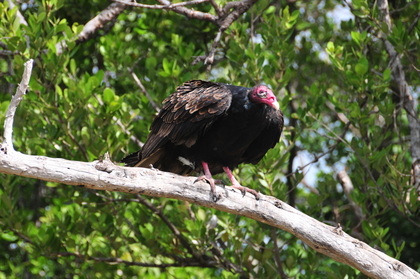 If we talk about one bird here at Field School that all of our students in the United States can probably go out and see for themselves, it's the Turkey Vulture (Cathartes aura), which can be found throughout the continental US during warmer months. Turkey Vultures are recognizable on the ground by their dark color and distinctive, bald red head. In flight, you will most often see them soaring on thermal currents, flapping their wings only infrequently. Turkey Vultures are carrion eaters, which means they eat (relatively freshly) dead animals--everything from fish washed up on shore to deer. You can often find them soaring around highways or trash dumps, looking for their next meal. They rarely hunt for themselves, and locate their food using scent, which is a very unusual ability for a bird to have. Although eating roadkill may seem gross, Turkey Vultures play an important ecological role in recycling nutrients and preventing disease. In some cultures, vultures are seen as sacred for this important work; Tibetan Buddhists practice "sky burials" in which vultures and other wildlife consume the dead and free the soul to move on to the afterlife. Of course, the vultures in Tibet are not the same as our friend the Turkey Vulture, but the ecological niche they occupy is very similar. Turkey Vultures and vultures throughout Europe, Africa and Asia are the products of what is called covergent evolution: they are so useful and important, ecologically, that similar animals evolved independently around the world without being closely related to each other. Some other cool Turkey Vulture facts:
Results from the North American Breeding Bird Survey suggest that Turkey Vulture populations have been increasing in the United States since 1966. However, prior to that their population was threatened by the pesticide DDT, and vulture populations in India have been very negatively impacted by chemical pesticides. If you want to learn more about Turkey Vultures, as always we recommend the Cornell Lab of Ornithology Website (http://www.allaboutbirds.org/guide/turkey_vulture/id) as a great starting point. And if you agree with us about how awesome Turkey Vultures are, we'd recommend that you check out this cartoon (http://birdandmoon.com/birdsaregross.html
0 Comments
Leave a Reply. |
Field Notes
Archives
July 2021
Categories |
|
Partner with us! We are always looking for new schools, scientists, and non-profit organizations to partner with. Please contact us here to start a conversation.
Hear from us! Sign up for our newsletter to hear about what is happening at Field School as well as upcoming offers and specials. |

 RSS Feed
RSS Feed